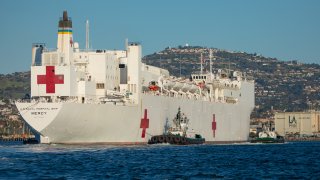
The Port of Los Angeles Wednesday announced it moved 688,999 cargo units in April, a 53% increase compared to March, but that number still represents a decrease of 6.45% compared to last April.
"Given the unique circumstances of a trade war and pandemic, April volumes are better than expected,'' Port Executive Director Gene Seroka said. "As we move deeper into the remainder of the second quarter, we're forecasting significantly lower volumes, particularly on the import side.''
Retail orders are low right now, Seroka said, as consumer purchasing and confidence has "dropped precipitously.''
"The outlook for the remainder of 2020 ... will be relatively soft,'' Seroka said "We have missed the spring fashion season, so our fast-fashion customers ... who have seen a drop in volume are struggling.''
April loaded imports increased 2.6% to 370,111 units compared to the previous year, the port reported. Loaded exports decreased 16.2% to 130,321 units. Empty containers declined 14.4% to 188,567 units.
Port volume is still moving at 80% of its usual cargo activity during this time of the year, and Seroka said "less cargo means fewer jobs,'' adding longshore shifts at the port are down about 19% compared to last year. They are down about 21% compared to the three-year rate at the port.
Seroka said that even with the decline in port activity, no terminals have been closed.
Through the initiative Logistics Victory of Los Angeles, or LoVLA, the port secured a contract with Honeywell for 25 million N95 face masks, and the first 100,000 will be delivered to first responders and medical workers no later than May 31, Seroka said.
LoVLA is also working to get medical gloves, medical gowns and face shields for frontline workers, and Seroka said medical facilities that needs supplies should contact the initiative through its website.



